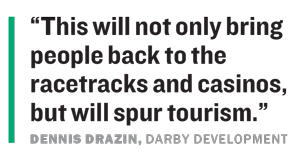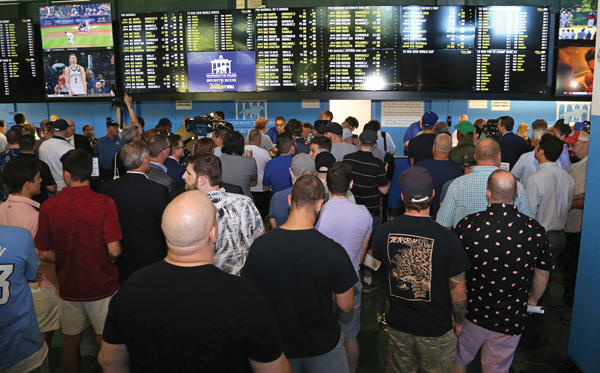
After taking a lead role in successfully challenging the federal law banning sports betting in most states, New Jersey is poised to reap the benefits, from a general economic boost to new pockets of opportunity in real estate development.
New Jersey’s state law legalizing sports wagering — signed by Gov. Phil Murphy on June 11, seven years after voters approved the idea by ballot — limits wagering to within casinos and horse racing tracks. Some developers are already cashing in, having set up “sports books” and other gaming areas well in advance. Others are just getting going.
Industry insiders say the opportunity for property growth isn’t limited to gambling facilities. Housing for additional employees and new retail near gambling centers could also be in the future. And currently defunct horse racing sites may be back in the game, as owners of some former tracks look to take advantage of the new law.
Moving forward at Monmouth
To open sports betting at Atlantic City’s Borgata Hotel Casino & Spa, former basketball star Julius Erving placed the casino’s first wager, a $5 bet on the Philadelphia Eagles to win the Super Bowl in 2019.
The Borgata, the first Atlantic City casino to open sports betting windows, is a subsidiary of MGM Resorts International. The numbers its parent company reports in Nevada are staggering: The company says it takes more than 4 million sports bets each year, for a total of more than $1 billion wagered.

If New Jersey’s casinos and racetracks can see even a fraction of that wagering, the impact could be transformative to local businesses, said Jay Coffey, mayor of Oceanport, home to Monmouth Park. Sports gambling was available at the Jersey Shore-adjacent racetrack just days after the governor signed the law.
Monmouth Park has been ready to offer sports betting to the public since earlier this year, said Dennis Drazin, chairman and CEO of Darby Development, which operates the track. The facility was well prepared for the Supreme Court’s May decision striking down the Professional and Amateur Sports Protection Act, the law that prevented most states from offering sports gambling.
The company entered into a $1.5 million deal with the British bookmaker William Hill in 2013. The agreement gave William Hill the naming rights to space within the clubhouse that was renovated and would eventually be used for sports betting.
On June 15, the William Hill Race and Sports Bar was officially open to take sports wagers at six tellers. Another 15 sports betting windows are now available in the grandstand, giving patrons more reasons to visit during the week. Monmouth hosts 52 days of live racing from May to September, but is also open daily year-round for those betting on races at other tracks.
Now, with an expected influx of gamblers on everything from the World Cup to the NFL, plans are on the table for an addition to the clubhouse, said Drazin. Part of the deal with William Hill includes another $5 million investment in the sports book to create a “Las Vegas-style, upscale betting” area, he said.
“This will not only bring people back to the racetracks and casinos, but will spur tourism,” Drazin said.
Other betting hot spots
The New Jersey location that offers the closest access to millions of New York gamblers is the Meadowlands Racetrack in East Rutherford, less than 20 minutes from Manhattan by car or bus.

People line up on the first day of sports betting at Monmouth Park.
Since 2011, the Meadowlands has been operated by real estate developer Jeff Gural, who led an extensive overhaul of the facility in 2013. In June, the Meadowlands announced a deal making Betfair US — a subsidiary of the global bookmaker Paddy Power Betfair — the operator of the Meadowlands’ onsite and mobile sports betting. A temporary sports betting facility is expected to be complete by mid-July, and the mobile app will follow later. “Hopefully, we will have the online component open by football season,” Gural said.
There is an open question about the effect of legal online sports betting: Will it stoke or depress the consumer’s interest in wagering at a brick-and-mortar facility?
Sports betting has already been online illegally for years, with no benefit to the tax coffers. Legal online alternatives could mean as much as $8.4 billion in state, local and federal taxes, according to a study by Oxford Economics commissioned by the American Gaming Association. The same study estimated that sports betting overall could contribute $22.4 billion to the national GDP.
“In-play” betting, where odds evolve after play has begun, is another addition meant to attract gamblers to sports books and keep them playing; In-play betting enables a greater variety of bets on an event. At Ocean Resort Casino, which opened in Atlantic City this summer (see page 14), William Hill will operate a 7,500-square-foot sports book featuring live sports events and in-play wagers.
Getting into the action
The state law’s definition of a racetrack includes sites where horse racing was conducted within 15 years prior to 2014, when then-Gov. Chris Christie signed an early version of the legislation.
That 15-year window could enable gambling at two locations: the former Garden State Park Racetrack in Cherry Hill, which hosted racing from 1942 to 2001, and the former Atlantic City Race Course, which operated from 1946 until 2015.
Located in southern New Jersey, the Cherry Hill site today bears no trace of a grandstand or stables. On the land now is the 285,000-square-foot retail development Towne Place, part of Garden State Park, which also includes luxury housing. A sports betting facility on the property is under construction, according to a spokesman.
Perhaps an even bigger opportunity, though, awaits at the former Atlantic City Race Course. The 250-acre property does not have to be turned back into a working racetrack or a casino in order to operate a gambling entity, leaving the door open to creative planning. Greenwood ACRA Inc. owns the site; representatives of the company could not be reached for comment.
Although it will take some time before betting is available at either the former track or the upscale Towne Place, advocates for sports betting say they are playing the long game.
